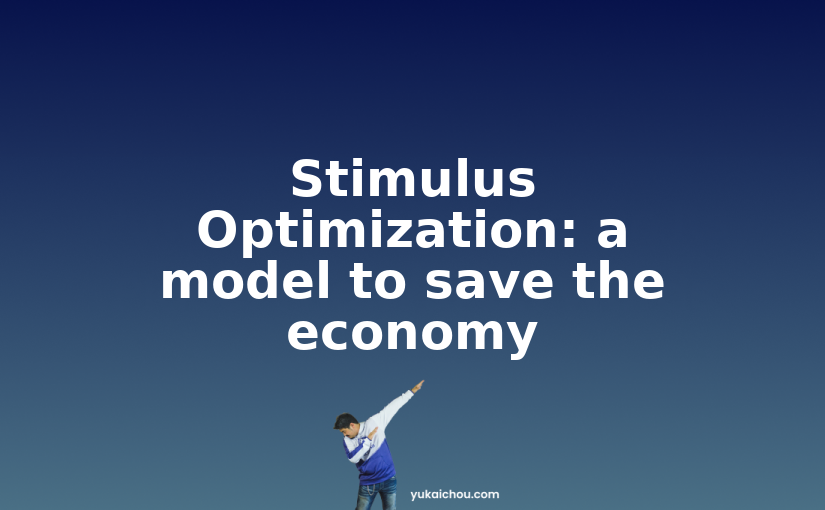Trickle Up Stimulus Optimization Theory
I’m going to give you what I believe is the best strategy for Stimulus Optimization, and then layout the logic that got me to my conclusion. (Note: since we’re talking about an economy at large, I’ll be doing a lot of generalizing for demographics. I obviously know not ALL people in that demographic are like that).
1. Money should stay circulated in old lower income males, small businesses (but not large corporations), social enterprises and non-profits.
2. Money should be put into industry-creating technologies, but not just for technology development but also the commercialization of the technology. The government should support tons of startup entrepreneurs but pay them just enough for them to survive.
3. Money should be put into essentials of society like Education, Healthcare and Tech Infrastructure.
Some of this may seem unintuitive, or possibly biased/humanitarian, but I do believe that this is most economically efficient. Let me explain why.
Underlying Principles
So my theory is derived from the following principles:
1. The economy is maintained based on money flowing from one person to another.
2. When someone has money, they spend a certain amount and save a certain amount, creating a spend/save ratio for each individual.
3. If everyone is frightened and saves, the economy will become worse because no one spends and no one makes income.
4. As a result, money must go through the people who have the highest spend/save ratios and extend to as many nodes in that group as possible.
5. Technology advancements create new industries and provides thousands of new jobs. More than 20% of the jobs today didn’t exist 20 years ago.
6. For the US to stay strong, it should take the actions of which made poor countries rich.
7. There are some things that MUST be there for a country to function, such as healthcare and education. In this case, it doesn’t matter if it is financially efficient or not. It must be done.
Give money to people who have high spend/save ratios who also buy from other high spending entities
So we know that money NEEDS to stay in the hands of those who have a high spend/save ratio. Once it hits a low spending ratio, it will be saved up and others will lose income. So it is important to identify demographics that tend to spend a lot of what they have:
-Low income families spend most of the money they make because they have to. They are buying essentials for survival and it is very hard for them to save money. On the other hand, the middle class wants to save up due to uncertain times, and they can afford to save money.
-The elderly usually spend more money because their necessities increase, and the value of saving for the future for them decreases. Yes, they are worried and would save too, but I believe it would still be lower than those who are in their 30s.
-White males probably have a tendency to spend more than asian females because of cultural values and because woman on average look for security and are more careful with their money. (Note: someone pointed out that women are shopping machines, but I think that men buy more expensive toys. Women could buy $2500 handbags, but more men than women eye at $120,000 cars just to look successful).
One very important thing to note is that, even if you give money to a person with a high spend ratio, if he spends it on a large corporation, then it becomes less ideal. Yes, corporations spend lots and lots of what they have to operate business. However, they usually pay their employees who are white collar workers (middle class who saves), and the rest go to wealthier shareholders who will hold on to their money very tightly.
However, if this high spend ratio person spends money at small mom & pops businesses, the small businesses would probably still need to spend more money for essentials instead of thinking of their juicy profits. They probably also pay a lot more low income people again who have a high spend ratio. In this sense, putting money into nonprofits and social workers accomplish both goals of flowing through low-income spenders and fulfilling essentials that keeps society functional.
Invest in high potential companies like a Venture Capitalist instead of a Distressed Buyout Firm
Right now the government is bashing a lot of dollars into companies that are struggling. However, given the economy, even healthy companies are losing money and making even grimmer future projections. The chances of these dying companies turning into sustainable profitability is extremely slim. Instead of mending a broken rice bag, the government should focus on knitting a new one to catch the leaked rice.
To save the economy, the government must operate like a Venture Capitalist. It needs to invest in high-growth potential industries. Each dollar needs to go into something that can potentially make thousands of dollars in return (the venture capitalist model: most investments will fail but the ones that succeed will make 100x the investment). These industries can create a lot more jobs that would allow a comeback in the economy.
Like VCs, instead of simply investing in technologies, the government should help them become commercialized and accelerate market adaption as most paradigm shifting technologies take years to become a business. The US should do what caused countries like Taiwan and Japan to achieve their economic miracles via technology a few decades ago.
I therefore suggest that the government subsidizes lots and lots of high-tech startups. They should subsidize just enough for the employees to sustain their lives. That way, startup people will be too poor to save money, and they’re EXTREMELY efficient in driving innovation with very little money. Trust me, A LOT of startup people will continue to do what they love if they didn’t need to worry about basic living (I live frugally on around $1000 a month so my business can be successful). The problem with the US economy is not that we don’t produce. Its that too many people get paid too much without TRULY creating value that is worth that much.
Internet Infrastructure should be among essentials
I don’t need to spend time arguing why the government should help out with essentials. We need sewage systems, healthcare, education and such no matter what. However, I do want to argue that fast internet should be an essential too.
The internet is something extremely cheap (when’s the last time you complained about internet price?), but has the potential to impact millions of lives, rich or poor. Internet infrastructure will simply make everything so much more efficient and faster that the chances of producing $1000 with $1 becomes much more likely. Essentially, any poor boy with the internet could be educated, reputable, and could be potentially running a million dollar business to feed his family.
What the Government is doing today
With this framework in mind, I was pretty happy to see that it is actually what the government is doing today. The government is obviously pouring tons of money into the essentials like healthcare, social enterprises, and internet infrastructure (awesome). The government is also investing in high growth markets like clean energy and sustainable technologies, so that’s good too.
What I would urge the government to do differently is to stop funding those companies who made the mistakes with our taxpayers money. At least make sure every $1 you give them, they are able to produce $10 back, not to give bonuses but to save the country. In 2007, the top 5 financial firms on Wall Street alone paid out $39 Billion worth of bonuses, even though that year the firms’ shareholders collectively lost about $74 billion in stock declines (worst since 2002). Guess how much of that money actually became someone else’s income? And how much of that went to sleep safely in a Swiss bank?
Finally, the government should really focus more on small businesses and start-up entrepreneurs, since it helps with both money circulation and driving new innovation. If the government does all of that, I think there will be hope we can believe in after all.
For a follow-up on this model, read this article: The government should pay entrepreneurs salaries to save the economy









11 responses to “Stimulus Optimization: a model to save the economy”
So what happened to all that stimulus?
Haha, yea, they were hotdog, underdog, and wazzup dog 😀
True. The people who make $250K a year anticipate making more money so they live to even higher standards :/ Although doesn’t supposedly 1% of the population own 40% of the wealth or so?
Cool thing on the agreement. A revenue business has a better foundation than a valuation business 🙂
Yea, the unsuccessful startups would be more an issue that we need more data and tools to answer properly…
Good talk. How’s the job going?
Haha, yay! I enjoy this comment conversation. Everytime someone disagrees on something you think “oh no! Would I prove out to be an idiot?” Hahaha.
Btw, if you didn’t realize, my product examples are all replacing the term “dog” with “fish.” 🙂
Inflation is not evil, but high inflation is. If the government owes more money than the entire world GDP, that becomes a possibility.
Really about the savings rate for the rich? I feel like the people who are making $100M a year aren’t really spending $90M a year…I thought most of them is sitting in some asset that makes them feel valuable with their high network.
Relating to startups, I’m referring to ones that have real revenue models that CLEARLY “make more money in revenues than you put down.” Google is a big revenue success, but most of the clear ones are actual hardware products like semi-conductors, robots and cellphones (which is the stuff that got Taiwan and Japan and probably Korea to lift off). Another thing is about startups though, yes, most of them fail, but I believe that the money they spend (aka waste in your view) will be those that have a higher spend rate (low paid employees, cheap services etc), so ultimately it would be doing some good for society, just not compounded as much as the businesses that actually create a good industry.
Thanks for the time and insights! 😀
Wow, that was long. Should have been another blogpost, hahaha!
Hey Steve,
Thanks for the thoughtful comments! My post actually didn’t come from some tech-heavy news source. Most of them is just from my own speculation. Although I do listen to the Wall Street Journal This Morning and read Tech Stuff a lot, so I’m sure I would be influenced by that.
I feel like the true insight is the part where money needs to stay in high-spending ratio nodes for as long as possible. The government has been doing a lot of what I suggested, but there’s still a big difference. One big theory is that the government should give money to rich people because they create jobs and it trickles down. I think in general that is a good idea but the problem is a higher percentage of that is saved up and does not become peoples’ income.
Yes, savings is important for investment, but lets think of a simple economy with only 3 people (this may not be for you Steve but just a general explanation to people). Lets say they each sell hotfish, underfish, and wazzup fish separately. Lets say there’s $10 in the economy and lets say they all want to spend so they all buy $10 worth of goods. After spending $10, it goes around and someone uses his $10 to buy your goods again. So with the same $10, everyone made $50 each. However, once you hit a guy who decided to save up $6 out of that $10, now he only buys $4. You only make $4 and you use that $4 to buy from the 3rd guy. The third guy makes $4, and panics a little, so he saves $1 and buys $3 worth of goods from the saver. The saver then feels the economy is not doing too well and saves even more. After awhile, no one makes income and they all feel there is a depression even though The saver has cash sitting in his bank.
Even if the money saved was invested to the person who sells hotfish to buy more fishing rods, when no one is buying, its really pointless. What makes this situation worse is that the government is one of the three people, so he prints more money. Now there’s more money but not necessarily more goods as long as a lot of them is still saved up because of fear of the economy. That’s why I think the instant money hits a person who saves a lot, the economy saving power decreases dramatically.
I 100% agree with you about the virtual goods issue. There still needs to be a lot of essentials that people need. The reason why the economy pops is because there are too many items that people are “convinced” that it is worth a lot, and he convinces the next fool. So after awhile, everyone believes they are wealthier than they actually are. When they suddenly realize they are not as wealthy they believed there were, then they declare its a recession and stop spending. People should stick to the basics of having things priced at what they’re actually worth, instead of how good it is at fooling the next person.
Great so far! Learning a lot of good stuff. I actually spent a day learning flex/flash so I’m all up to speed on that finally, haha.
I recently delved into more of the server-side stuff and just finished reading a query optimization book. Which reminds me that I have a few concerns about some of the choices I made for the Viralogy database that I’d like to talk to you about so you can change whenever you get a chance! Just message me on gchat when you have some time 🙂
Haha, I actually did not realize hotfish -> hotdog!
When I commented about savings rate, I meant more about your standard issue rich (250k/year) and not the ultra rich. The 250k rich people take out mortgages and leases they can’t afford!
The ultra-rich put their money into credit markets, true, and I’m not really sure how that’s calculated in the savings rate… hrm.
I agree on the start-up revenue model selection then! 🙂
For unsuccessful ones, however, I think one has to take in the cost of starting up a new business and all the money that is lost by making beginners’ mistakes as well as the boons from cheaper labor. I’m not sure which one would come out ahead so I think it’s relevant to consider.
And thank you as well. It’s always nice to bounce off your own ideas/opinions with another person!
Hehe yeah it was – good though.
I had a response stating my disagreement with your loosely referenced trickle-up theory, but after thinking it through, I agree with you in most regards.
One thing I do disagree with it though is the presumption about spending ratios. The savings rate in the U.S. is around .5%… the rich ARE spending tons and tons of their money. If they weren’t this would be at a healthier level – like 7%.
Another comment, though not necessarily a disagreement, is that inflation is not this evil, horrible thing that the media has made people believe it is. Out-of-control inflation is bad, of course, but inflation is a monetary policy tool that can be extremely useful. Some countries are supposedly even trying (illegally) to devalue their currency in order to increase exports! And hey, at least it’s not deflation! 🙂
The “hotfish” example is a good one for showing the perils of a rapidly increasing savings rate. However, the savings rate in the U.S. only rose rapidly for a very short period – it’s still relatively stable, albeit extremely low, at this point.
This problem is largely related to people using their $10 to buy $50 of hotfish to make a huge profit. After a while, some of those borrowers realize they can’t sell their $50 of hotfish for $50 and so they default. Their creditors lose a little money and so call in their other loans – but those other debtors haven’t been able to sell all their hotfish yet so they have to default, etc., etc. Eventually, the creditors have to default themselves!
Stupid guy who borrowed hotfish he can’t sell… hehe.
In case I lost anyone there, the creditors in this example were banks who bundled all home buyers’ mortgages together assuming that the high credit risks (bad hotfish sellers) would be balanced out by the low credit risks (good hotfish sellers).
I also think it may not be such a great idea to subsidize start-ups. Sure, Google created a lot of value for society – but it’s not the norm. Meebo got almost $40 million in funding. $40 million! Honestly, I don’t need another instant messaging client and I don’t want money from taxes being spent on that. Further, as we’ve all read numerous times, most start-ups fail and waste a lot of resources. Start-ups that are frugal with resources are great, but once you subsidize them they’ll likely lose their thrifty roots.
I think speculation should remain with the super-rich. Imagine the public outrage if the government gave $50 million as a gift to new hedge funds so that they might create more wealth for society.
If you’re only talking about start-ups that produce real value, such as biotech, then I wholeheartedly agree. 🙂 I just think it’ll get extremely messy to choose which start-ups are worthy of the government’s support.
Good article! 🙂 I’m not sure how I feel about some of the things you mentioned (as noted!) but I appreciate the insights and think a lot of it is on-mark with my feelings!
Hey Yu-kai, I agree in general with most of the article though I’m guessing it came from some tech-heavy news source since it weights so heavily on tech and startups!
The big thing I felt was missing from this article… is the fact that almost all of its advice is exactly what the government/public has been doing for the past 15 years! The U.S. is partly in debt because its service sectors are growing so much faster than its manufacturing sectors.
When it comes down to it, people working at Facebook so they can purchase a premium account on Vimeo, which supports those working at Vimeo so they can buy virtual gifts on Facebook only works for so long. People need to eat and live in houses and brush their teeth. The U.S. needs more production in those final destination products.
That’s one opinion, at least! 🙂
Hello Lily
Thanks for the response! I actually think women are more conservative on spending either way. Yes, they shop a lot and buy a lot of clothes, but men like to buy large cars, large houses, premiere service plans, first class flights, private jets. The $1,200 handbag that a woman purchases may not be too much compared to toys that men buy. Plus, a lot of the stuff that women are also bought by men trying to please them. Some woman buy luxuriously when its not their own money, but can cut down when they have a smaller budget. Men have some kind of competitive pride that forces them to buy things that increase their status, even though they might be low on budget this month. I truly believe that women value savings more than men, even though many are shopaholics. So I think giving money to men will help more.
I’m actually not referring to more taxes. I’m more referring to money-dumping. The government could probably do something that says if you make more than $250K in PERSONAL wealth, you get taxed more, but if you keep it flowing in the business and expand etc, you get taxed less. So maybe reinvested profits will be taxed less, but dividends will be taxed more (2nd taxation?). That way owners have more of an incentive to keep the money flowing in the business and create more jobs. Because truly, if someone is making $700K a year, I really don’t think he’s going to spend anywhere close to 80% of that (and if he does, people might say he is “irresponsible”) 🙂
Yu-Kai, I agree with your general principles. I don’t agree with the part about woman’s spending habits. Do you not see that the whole consumerist culture and department stores target women as their primary customer? But then again, women may act more conservatively than men in a bad economy and save more money. I also think the 250k threshold is too low – many successful business owners who actually create jobs may actually make between 250k and 1 mm a year and they certainly don’t need more tax at this moment. In an ideal world, if complete optimization were to occur, the government should hire experts and evaluate individuals and business on a case-to-case business, but I guess that’s just not feasible.